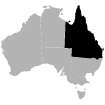APSA INTERNATIONAL INDUSTRY PROGRAM
EXPRESSION OF INTEREST
The Asia Pacific Screen Awards (APSA), proudly supported by Screen Queensland, invites Queensland practitioners to submit your Expression of Interest to join the 12th Asia Pacific Screen Awards Nominees and delegations in their International Industry Program Monday 26 November – Friday 30 November 2018.
The APSA International Industry program offers a unique opportunity for local filmmakers to meet and network with APSA’s invited nominees from across the Asia Pacific region.
You will have the opportunity to discuss topics at the Round Tables such as Censored and Challenged Films, the Urban and Rural Disconnect, and discussion on the complexities of Access to Refugees and their stories and Diversity in Film.
The program held over five days provides free discussion, thought provoking conversations and the opportunity to hear stories and experiences outside of the norm.
The program will include Masterclasses, Exhibitions, Screening, Industry mixers and In-Conversations plus our intimate Roundtable discussions.
The Expression of Interest is open until 30 October with successful participates notified in early November.
Once accepted you will have access to the APSA Exclusive Portal where you’ll be able to confirm your attendance at the different events hosted this year and find out more on the filmmakers whom you will meet.
APSA has recently announced the full list of nominees for the 12th Asia Pacific Screen Awards with nominations going to a total of 46 films from 22 countries.
Films from Japan and the People’s Republic of China lead the tally with seven nominations each. Films from Australia, India and Kazakhstan each received five nominations and Uzbekistan has received a nomination for the first time. For more information on our nominees visit APSA.
Register your Expression of Interest APSA International Industry Program HERE
The APSA 2018 Round Table Discussions:
Censored and Challenged Films
In our democratic society, secrecy and openness reflect conflicting values and social needs causing dynamic tension. Censorship is the effort to control information about the revelation of known truths. By doing so, they ‘protect society.’ The search for truth and the insight to misinformation in the struggle for balance is always a challenge for creating a film.
Urban and Rural Disconnect and Access
Films are reconstructions of historical events focusing on the complexity of human experiences and partiality of historical evidence and geographical location. How to overcome the challenges of difficult access or remote locations when creating a film.
Refugee Storytelling
The access and challenges to the real stories of the refugee. The complexities to revealing these stories of displaced people through drama or documentary. The challenges of permission, perspective (filmmaker as an outsider if not telling own story) access and government intervention.
Diversity in Film
How do we be inclusive of ‘all walks of life’ in a cinematic world that usually focuses on the dramatic elements and beauty of people and places? Why include characters with a disability, disease or in a minority group of society?




